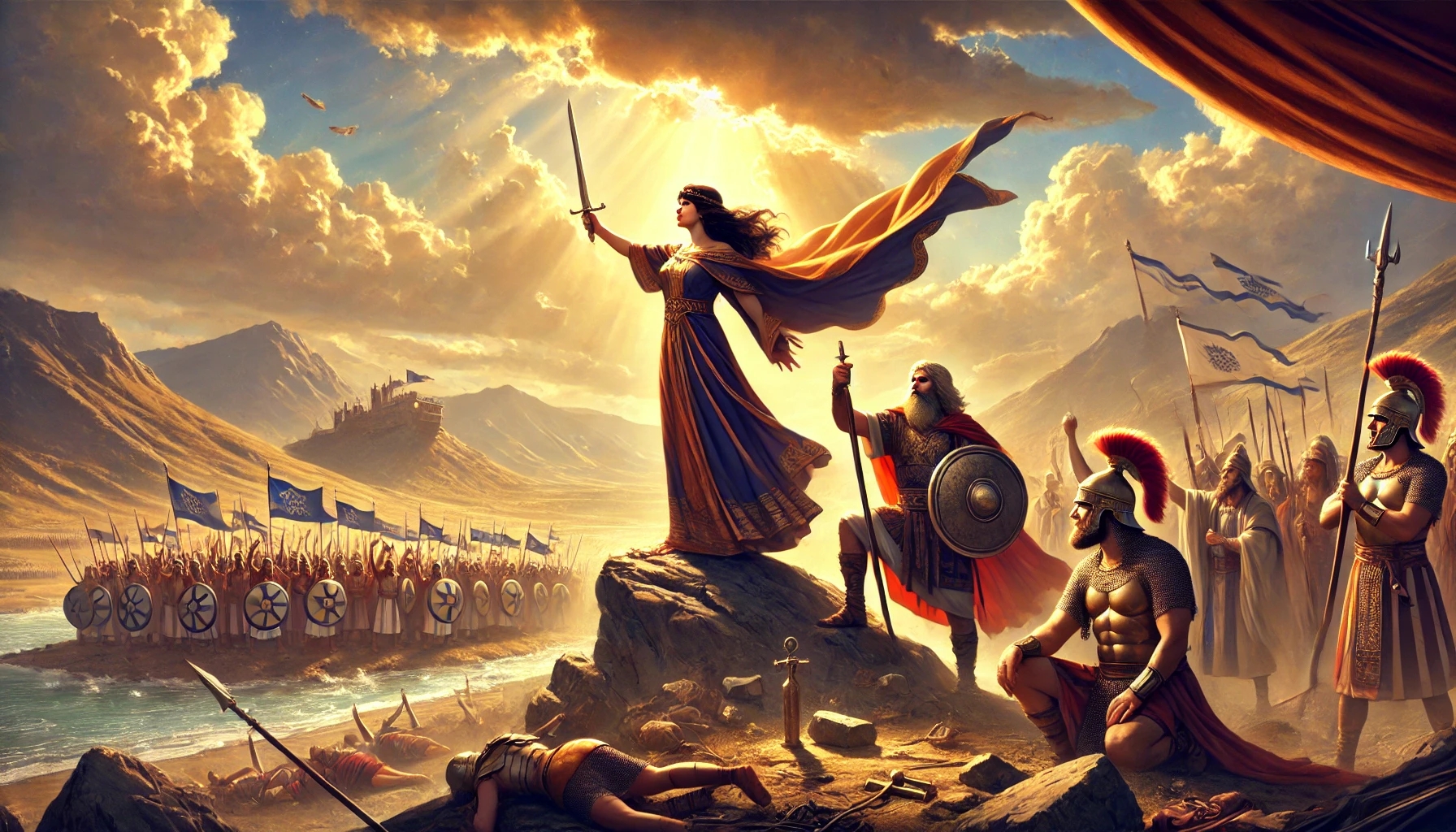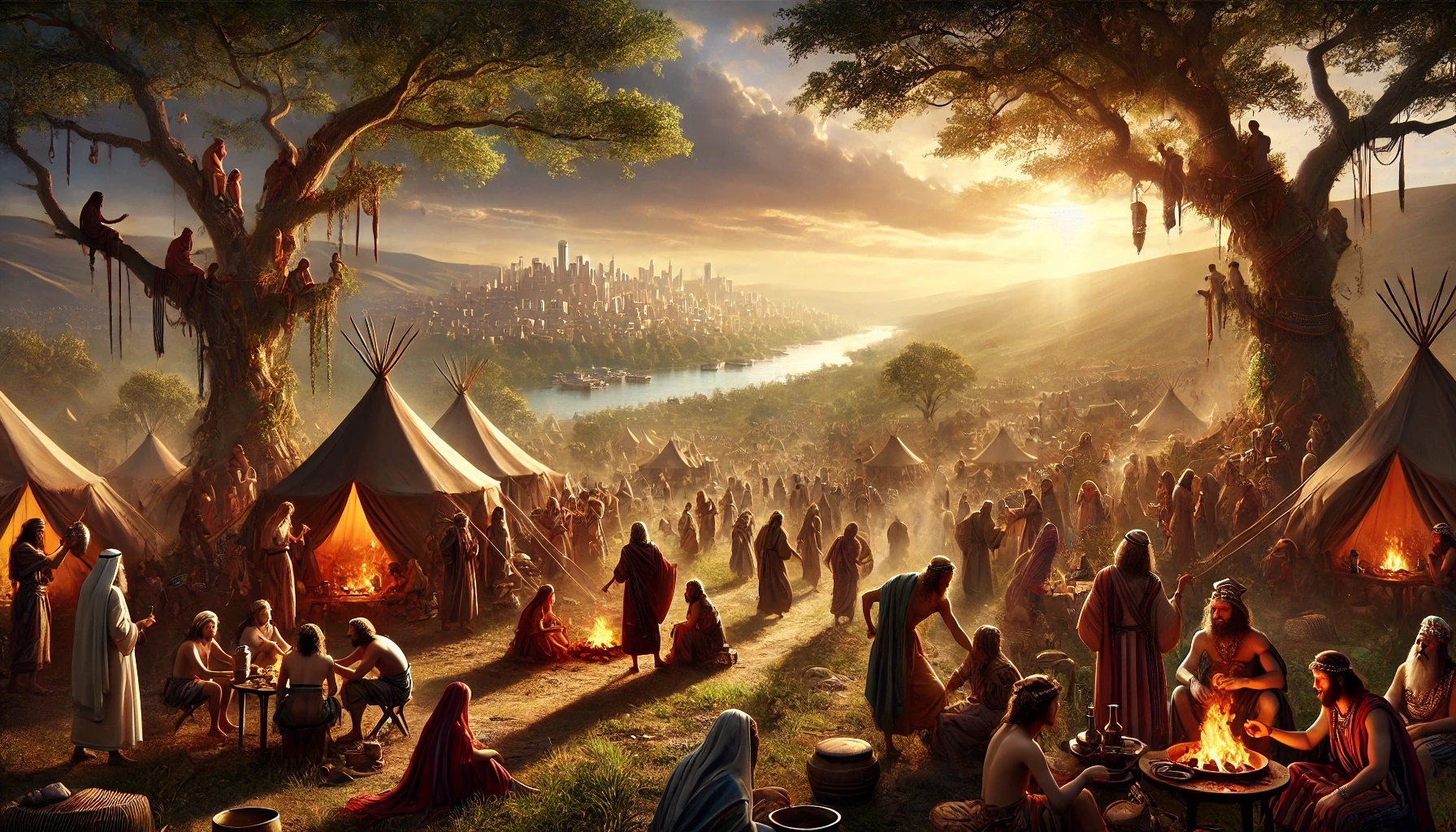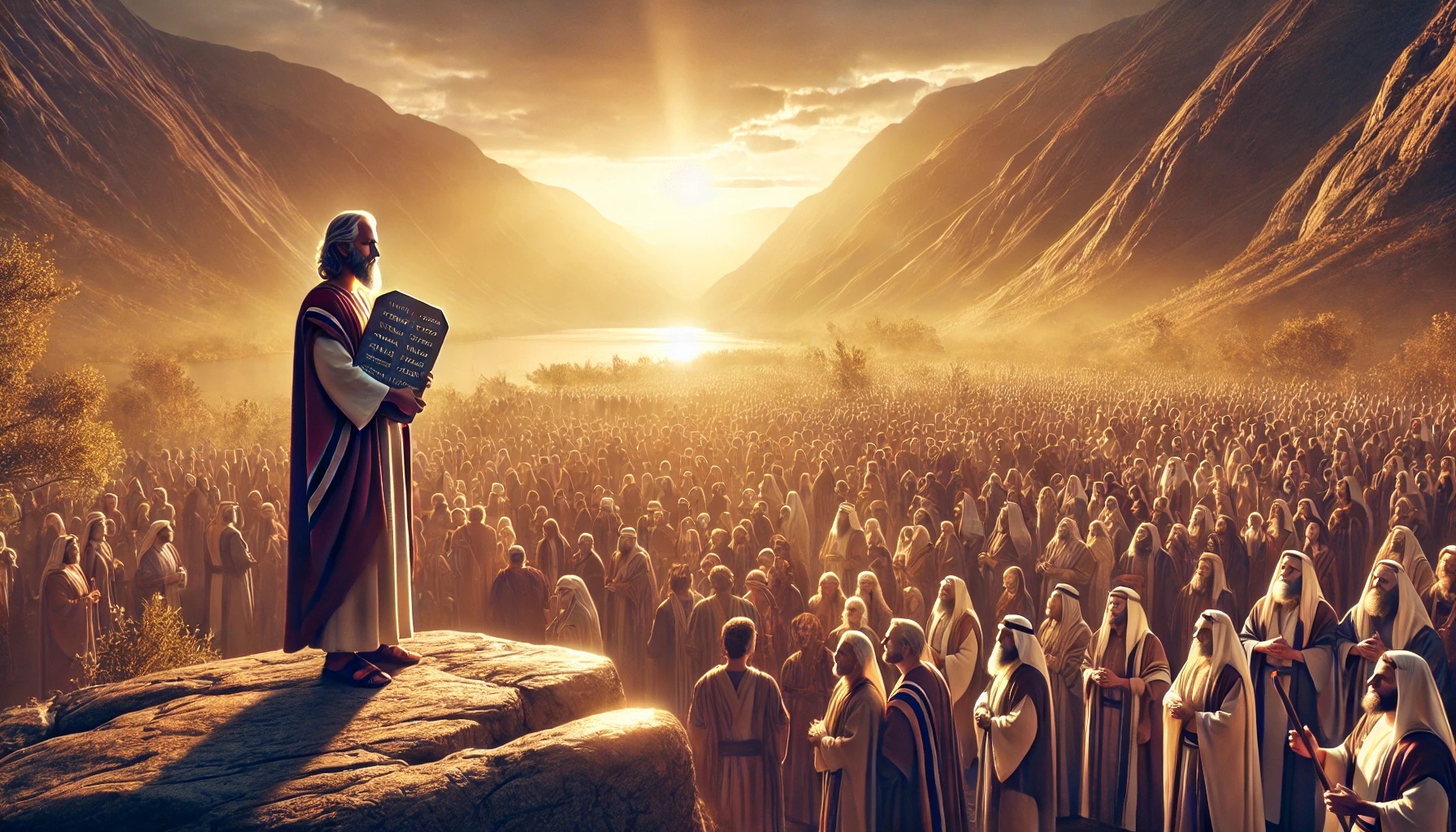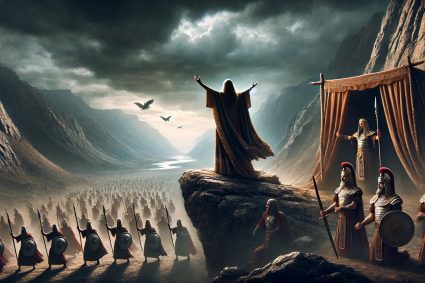
📅 18.November 2025
📚 BELIEVE HIS PROPHETS
📖 Daily Bible Reading
⚖️ Judges 5 – The Triumph of Faith – Deborah and Barak Praise the Lord
✨ A Song of Liberation, Courage, and Divine Justice
📜 Bible Text – Judges 5 (KJV)
1 Then sang Deborah and Barak the son of Abinoam on that day, saying,
2 Praise ye the Lord for the avenging of Israel, when the people willingly offered themselves.
3 Hear, O ye kings; give ear, O ye princes; I, even I, will sing unto the Lord; I will sing praise to the Lord God of Israel.
4 Lord, when thou wentest out of Seir, when thou marchedst out of the field of Edom, the earth trembled, and the heavens dropped, the clouds also dropped water.
5 The mountains melted from before the Lord, even that Sinai from before the Lord God of Israel.
6 In the days of Shamgar the son of Anath, in the days of Jael, the highways were unoccupied, and the travellers walked through byways.
7 The inhabitants of the villages ceased, they ceased in Israel, until that I Deborah arose, that I arose a mother in Israel.
8 They chose new gods; then was war in the gates: was there a shield or spear seen among forty thousand in Israel?
9 My heart is toward the governors of Israel, that offered themselves willingly among the people. Bless ye the Lord.
10 Speak, ye that ride on white asses, ye that sit in judgment, and walk by the way.
11 They that are delivered from the noise of archers in the places of drawing water, there shall they rehearse the righteous acts of the Lord, even the righteous acts toward the inhabitants of his villages in Israel: then shall the people of the Lord go down to the gates.
12 Awake, awake, Deborah: awake, awake, utter a song: arise, Barak, and lead thy captivity captive, thou son of Abinoam.
13 Then he made him that remaineth have dominion over the nobles among the people: the Lord made me have dominion over the mighty.
14 Out of Ephraim was there a root of them against Amalek; after thee, Benjamin, among thy people; out of Machir came down governors, and out of Zebulun they that handle the pen of the writer.
15 And the princes of Issachar were with Deborah; even Issachar, and also Barak: he was sent on foot into the valley. For the divisions of Reuben there were great thoughts of heart.
16 Why abodest thou among the sheepfolds, to hear the bleatings of the flocks? For the divisions of Reuben there were great searchings of heart.
17 Gilead abode beyond Jordan: and why did Dan remain in ships? Asher continued on the sea shore, and abode in his breaches.
18 Zebulun and Naphtali were a people that jeoparded their lives unto the death in the high places of the field.
19 The kings came and fought, then fought the kings of Canaan in Taanach by the waters of Megiddo; they took no gain of money.
20 They fought from heaven; the stars in their courses fought against Sisera.
21 The river of Kishon swept them away, that ancient river, the river Kishon. O my soul, thou hast trodden down strength.
22 Then were the horsehoofs broken by the means of the pransings, the pransings of their mighty ones.
23 Curse ye Meroz, said the angel of the Lord, curse ye bitterly the inhabitants thereof; because they came not to the help of the Lord, to the help of the Lord against the mighty.
24 Blessed above women shall Jael the wife of Heber the Kenite be, blessed shall she be above women in the tent.
25 He asked water, and she gave him milk; she brought forth butter in a lordly dish.
26 She put her hand to the nail, and her right hand to the workmen’s hammer; and with the hammer she smote Sisera, she smote off his head, when she had pierced and stricken through his temples.
27 At her feet he bowed, he fell, he lay down: at her feet he bowed, he fell: where he bowed, there he fell down dead.
28 The mother of Sisera looked out at a window, and cried through the lattice, Why is his chariot so long in coming? why tarry the wheels of his chariots?
29 Her wise ladies answered her, yea, she returned answer to herself,
30 Have they not sped? have they not divided the prey; to every man a damsel or two; to Sisera a prey of divers colours, a prey of divers colours of needlework, of divers colours of needlework on both sides, meet for the necks of them that take the spoil?
31 So let all thine enemies perish, O Lord: but let them that love him be as the sun when he goeth forth in his might. And the land had rest forty years.
══════════════════════════════════════════════
🔵 Introduction
Judges Chapter 5 is one of the oldest and most significant poetic works in the Old Testament. It is the so-called “Song of Deborah”, a victory hymn sung by Deborah – a prophetess and judge – together with Barak after Israel’s triumph over the Canaanites. This poetic passage is not only a thanksgiving, but also a call to faithfulness to God, a historical reflection, and a prophetic warning.
══════════════════════════════════════════════
🟡 Commentary
🟪 1. Introduction of the Song (Verses 1–3)
Deborah and Barak begin with a call to praise the Lord. They celebrate God’s leadership and the courage of the people:
“Praise the Lord, that Israel has become free again” (v. 2)
🟪 2. God’s Presence in the Battle (Verses 4–5)
The poem describes how God’s power became visible – the earth shook, the heavens poured – a metaphor for His active presence in Israel’s story.
“The mountains melted before the Lord” (v. 5)
🟪 3. Israel’s Condition Before Deliverance (Verses 6–8)
The people were oppressed, the roads were unsafe, courage was lost – no spear or shield among 40,000 men. Leadership was missing.
“There was no governance in Israel” (v. 7)
🟪 4. A Call to Acknowledge Leaders and God’s Intervention (Verses 9–13)
Deborah praises those who joined the battle – with special mention of Barak and her own role as “a mother in Israel”.
“Arise, arise, Deborah!” (v. 12)
🟪 5. Participation and Reluctance Among the Tribes (Verses 14–18)
Some tribes (Ephraim, Zebulun, Naphtali) fought bravely. Others (Reuben, Gilead, Dan, Asher) stayed passive. The song critiques their indifference.
“Why do you stay among the sheepfolds…?” (v. 16)
🟪 6. Divine Assistance (Verses 19–21)
The victory is attributed to God: even the stars and the Kishon River fought against Sisera.
“From heaven, they fought…” (v. 20)
🟪 7. Curse and Blessing (Verses 22–24)
Meroz is cursed for not helping God. Jael is blessed – she courageously kills the enemy commander Sisera.
“Blessed above women is Jael” (v. 24)
🟪 8. The Enemy’s Tragedy (Verses 28–30)
A striking image: Sisera’s mother looks out the window, waiting for her son, expecting glory – not knowing he is already dead.
🟪 9. Final Blessing (Verse 31)
A powerful conclusion: May all enemies of God perish, but may those who love Him shine like the rising sun!
“And the land had rest for forty years.”
══════════════════════════════════════════════
🟢 Summary
The Song of Deborah is a testimony to God’s mighty intervention in the history of His people. It shows how God works through courageous men and women, the importance of obedience and willingness – and that God is with His people when they are faithful to Him. At the same time, it criticizes those who remain passive and withdraw when commitment is needed.
══════════════════════════════════════════════
📢 Message for Today
🟦 1. God works through people – including you!
Deborah, Barak, and Jael show: courage, faith, and willingness make the difference.
🟦 2. Obedience brings freedom.
Israel’s oppression ended only when they listened to God and fought. Today, too, we experience spiritual freedom through surrender.
🟦 3. God is present in the battles of our lives.
The stars fought, the water flowed – God even directs nature when it’s about His plan.
🟦 4. Women in leadership roles
Deborah and Jael powerfully demonstrate: God uses women just as mightily as men.
🟦 5. Praise as a response to victory.
After the victory comes the song – gratitude should be a constant part of our lives.
══════════════════════════════════════════════
💬 Reflection Thought
Where am I willing to serve God – even when it takes courage?
Am I like Deborah, who rises? Like Jael, who acts? Or more like Reuben, who stays behind the fences?
Today is a day to ask God:
“Lord, where do you want to use me?”
~~~~~ ⚖️ ~~~~~

📆 16–22 November 2025
📚 BELIEVE HIS PROPHETS
📖 Weekly Reading – Spirit of Prophecy
📘 Ellen White | Patriarchs and Prophets – Chapter 41
🔥 Apostasy at the Jordan | Warning against spiritual apostasy and moral seduction
🌐 Read online here
═════════════════════════════════════════════
🔵 Introduction
The people of Israel stood directly at the border of the promised land. After great victories and divine guidance, the long-awaited homeland was within reach. But precisely in this moment of outward success, rest, and comfort came one of the worst spiritual collapses in Israel’s history: the apostasy at Baal-Peor.
This chapter vividly describes how moral seduction, spiritual unfaithfulness, and worldly mingling separated God’s people from their Lord—and what deep spiritual lessons it holds for us today.
═════════════════════════════════════════════
🟡 Commentary
🟪 1. The surroundings of Shittim – beauty and danger
Israel camped in a fertile, tropical plain by the Jordan. Outward prosperity, pleasant surroundings, and rest felt relaxing—but also disarming. This phase of leisure became a spiritual trap.
🟪 2. The secret seduction by the Midianite women
Midianite women entered the camp unobtrusively. Their intention was not friendship, but targeted seduction into sin. Under the guise of harmony and culture, the Israelites were to be led into idolatry and moral excess.
🟪 3. The feast in honor of the idols – Balaam’s strategy
Balaam, who had previously been unable to curse Israel, now found another way: he led the people close to temptation. Music, wine, cheerful feasting, and sensual allure undermined their self-control. Moral fall turned into idolatry.
🟪 4. The deadly plague – the consequences of apostasy
The spiritual and moral collapse had catastrophic consequences:
– A plague broke out that took tens of thousands.
– The leaders of the apostasy were judged.
– The camp underwent drastic purification.
🟪 5. The zeal of Phinehas
With holy determination, Phinehas acted to stop the judgment.
God affirmed his action and granted him the “covenant of peace”—an everlasting priesthood.
The message: God’s zeal against sin is an expression of His love for His people.
🟪 6. God’s judgment on Midian
Because Midian had deliberately led Israel into sin, divine judgment followed.
The lesson: those who cause others to fall spiritually bear tremendous responsibility.
🟪 7. The timeless warning—from the Old Testament to the end times
The account is not merely past. Paul explicitly states:
“This happened to them as an example … written for our admonition.” (1 Cor. 10:11)
Just as then:
– Seduction through pleasures
– Blending with worldly values
– moral dullness
– playing with temptation
still lead us away from God.
🟪 8. The spiritual mechanism of falling
The decline does not begin suddenly, but:
– thoughts become impure
– vigilance weakens
– prayer is neglected
– association with the world becomes careless
– small compromises accumulate
– in the end, a person visibly falls into sin
🟪 9. God’s way of escape: purity of heart
The Bible calls for a sanctified, guarded inner life:
– “Guard your heart” (Prov. 4:23)
– “Gird up the loins of your mind” (1 Pet. 1:13)
– “Whatever is true… think on these things!” (Phil. 4:8)
– “Create in me a clean heart” (Ps. 51:10)
Victory over temptation always begins in the heart—not in outward behavior.
═════════════════════════════════════════════
🟢 Summary
The apostasy at the Jordan shows that the greatest enemy of God’s people is not external threats but inner susceptibility. Israel did not fall by war, but by moral corruption and spiritual negligence. The path into sin began quietly, led to open excess, and ended in heavy judgment. Yet God offers purity, renewal, and protection to those who remain watchful and treasure His Word in their hearts.
═════════════════════════════════════════════
📢 Message for Us Today
Spiritually speaking, we stand just as close to the “heavenly Canaan” as Israel did then. That is why the danger today is great—to fall in this final phase of history through comfort, worldly blending, or moral temptation. Satan uses the same means as then:
– sensual allure
– love of pleasure
– mingling with godless values
– neglect of prayer
– compromises in thinking
Therefore God’s call is:
Watchfulness, purity of heart, separation from destructive influences, and deep connection with His Word.
═════════════════════════════════════════════
💬 Reflection Questions
What “Shittim moments” are there in my life—times of rest or self-satisfaction when I am particularly vulnerable to temptation? And how can I guard my heart before small compromises grow into great sins?
~~~~~ ⚖️ ~~~~~

📆 16–22 November 2025
📚 BELIEVE HIS PROPHETS
📖 Weekly Reading – Spirit of Prophecy
📘 Ellen White | Patriarchs and Prophets – Chapter 42
🔥 The Law Repeated | Moses’ final exhortations and God’s enduring call to obedience
🌐 Read online here
═════════════════════════════════════════════
🔵 Introduction
Shortly before entering the promised land, Moses gathers the people of Israel one last time. He knows that his time as leader is ending—and that he himself will not enter Canaan. But before he departs, he repeats God’s law and reminds them of the great responsibility connected with the covenant with God. In a passionate, far-reaching appeal, he calls the people to faithfulness, obedience, and a choice for life.
═════════════════════════════════════════════
🟡 Commentary
🟪 1. Moses’ farewell in humility and concern
Moses asks God to allow him to go into the land—God does not permit it. Yet Moses accepts God’s decision and is not concerned about himself but about the people. He asks for a successor—and God chooses Joshua.
🟪 2. Joshua’s calling – a spiritual leader appointed
God chooses Joshua, “a man in whom is the Spirit” (Num. 27:18). Moses lays hands on him before the whole nation, investing him with authority. This shows: leadership is not human ambition but a divine commission.
🟪 3. Why the law needed to be repeated
The new generation was young at Sinai. They needed to hear God’s law again—to understand why obedience is the foundation for blessing, safety, and fellowship with God. The repetition was meant to touch heart and conscience anew.
🟪 4. Looking back at God’s guidance and grace
Moses reminds Israel of:
-
the deliverance from Egypt
-
the miracles in the wilderness
-
the giving of the law
-
God’s nearness
He shows: No other nation was ever so loved, guided, and blessed by God.
🟪 5. Israel—chosen out of love, not merit
“Not because you were more in number… but because He loved you” (Deut. 7:7–9). God’s covenant is based on faithfulness and grace—not on Israel’s strength. This truth is central to prevent pride and self-righteousness.
🟪 6. The promised land – both gift and responsibility
Moses describes the land: fertile, beautiful, supplied by God. But the warning follows immediately: When you are full, do not forget the Lord (Deut. 6:10–12). Prosperity can become a danger if it creates spiritual drowsiness.
🟪 7. Blessing and curse – the choice of life
Chapter 28 contains two mighty lists:
-
Blessing for obedience: abundance, protection, success
-
Curse for disobedience: hardship, scattering, judgment
These warnings were tragically fulfilled in Israel’s history—among them the destruction of Jerusalem by Rome.
🟪 8. The solemn appeal: Choose life!
“I have set before you life and death, blessing and curse… therefore choose life” (Deut. 30:19).
God does not force—He calls. Obedience is not external duty but a decision born of love for God.
🟪 9. The Song of Moses – remembrance in poetic form
To imprint everything, Moses composes a song. It recounts God’s dealings and warns toward faithfulness. The people are to memorize it and pass it on to future generations—God’s truth is meant to penetrate the heart.
═════════════════════════════════════════════
🟢 Summary
Chapter 42 is Moses’ final great appearance before his death. He repeats the law, calls the people to decision, and transfers leadership to Joshua. The heart of his message: Israel was chosen by grace—now they are to respond with obedience and love. Blessing and curse lie openly before them. The choice is theirs.
═════════════════════════════════════════════
📢 Message for Us Today
We too stand spiritually at the border of the “promised land”—the second coming of Jesus. God’s law still stands as the standard for our lives. The choice between life and death, obedience or our own path, arises anew each day. Prosperity, routine, and spiritual indifference are the same dangers now as then. God’s call applies to us as well:
– Choose life.
– Hold fast to the Word.
– Teach it to your children.
– Live with God—and for God.
═════════════════════════════════════════════
💬 Reflection Questions
➡️ What shapes my daily decisions—comfort or obedience?
➡️ Is God’s law alive in my heart—or merely a duty?
➡️ How can others tell that I have chosen life with God?
➡️ How can I pass on the spiritual heritage to the next generation?
══════════════════════════════════════════════
LuxVerbi | The light of the Word. The clarity of faith.




















